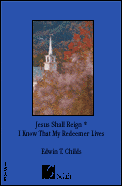|
Jesus Shall Reign &
I Know That My Redeemer Lives
Composer Edwin T. Childs
Texts "Jesus Shall Reign" Isaac Watts, 1719
& "I Know That My Redeemer Lives" Samuel Medley, 1775
Voicing SATB, organ, brass quintet, timp. and opt. cong.
Topics Church and Mission, Eternal Life, Kingdom of God, Praise & Adoration
Church Seasons Easter ("I Know That My Redeemer Lives"), Ascension & Reign ("Jesus Shall Reign")
Length 3' 40" Price $2.50 (U.S.) Released 5/00
Catalog no. 425-401 Difficulty Moderately easy
Discography Fill the World with Loudest Praise, St. Paul's Chamber Choir, Robert Brewer, conductor (Selah 520-425)
Order now!
Other editions 425-402--Cond. Score/Inst. parts Price $20 (U.S.)
Order Cond. Score/parts


Read a history of the hymn
Download a review copy of this anthem
 Description Description
With its dual texts, this piece is ideal for Easter, Ascension, Christ the King, mission Sundays, or general festival use. Brass quintet and timpani parts are easy enough to be manageable by good high-school players, and Childs' SATB choral writing is attractive and singable by any mixed choir. Use this again and again!
Text
Jesus Shall Reign
Jesus shall reign where'er the sun
does its successive journeys run;
his kingdom spread from shore to shore,
till moons shall wax and wane no more.
To him shall endless prayer be made,
and endless praises crown his head;
his name like sweet perfume shall rise
with every morning sacrifice.
People and realms of every tongue
dwell on his love with sweetest song,
and infant voices shall proclaim
their early blessings on his name.
Blessings abound where'er he reigns;
the prisoners leap to lose their chains;
the weary find eternal rest,
and all who suffer want are blest.
Let every creature rise and bring
peculiar honors to our King,
angels descend with songs again,
and earth repeat the loud amen.
--Isaac Watts, 1719
I Know That My Redeemer Lives
I know that my Redeemer lives;
O the sweet joy this sentence gives!
He lives, he lives, who once was dead;
he lives, my everlasting Head.
He lives triumphant from the grave;
he lives eternally to save;
he lives exalted, throned above;
he lives to rule his church in love.
He lives to bless me with his love,
and still he pleads for me above;
he lives, my hungry soul to feed;
he lives to help in time of need.
He lives, my kind, wise, constant Friend;
who still will keep me to the end;
he lives, and while he lives I'll sing,
Jesus, my Prophet, Priest and King.
He lives, all glory to his Name;
he lives, my Savior, still the same;
what joy the blest assurance gives:
I know that my Redeemer lives!
--Samuel Medley, 1775
History of the hymn
Isaac Watts wrote "Jesus Shall Reign," this paraphrase of the second part of Psalm 72, for publication in his Psalms of David, Imitated in the Language of the New Testament (1719). First published with eight stanzas, its title, "Christ's Kingdom Among the Gentiles," and lyrics echoed the growing contemporary awareness of the non-western world. It also anticipated the missionary activity that followed in the wake of British imperial expansion. Acclaimed as an early missionary hymn, it gained popularity especially in the nineteenth century as western Christians carried their faith around the world.
Watts (1647-1748), a Dissenting clergyman, contributed immeasurably to the form and corpus of English sacred song. As a youth in Southampton, England, he trained in rhetoric and classical prose. He shared with his father a taste for learning and poetry and an unusual facility with words. Watts disliked the psalm-singing in his father's congregation, claiming he observed a palpable "dull indifference" and "negligent and thoughtless air" as the psalms were sung. In response, he produced several alternatives that made him a pivotal figure in the history of Christian song. Among these was his Psalms of David containing "imitations" of 138 of the 150 Psalms. Watts differed with many of his contemporaries in his insistence that the Psalms did not offer adequate expression of Christian worship and emotion. Since the Reformation, they had constituted the principal corpus of English Christian song. In Psalms of David, Watts set out to give what he termed "an evangelic turn to the Hebrew sense" and to "accommodate the book of Psalms to Christian worship." His Psalms of David offers precisely what the title indicates: not new versifications of the Psalms, but imitations. Literary critic J. R. Watson notes in The English Hymn that Watts "recast the Hebrew, as if the psalmist were writing in the Christian era."
Watts often anglicized or westernized as well as Christianized the Psalms. For example, his second stanza of "Jesus Shall Reign" read:
Behold the Islands with their Kings,
And Europe her best tribute brings;
From North to South the Princes meet
To pay their homage at his feet.
American hymnals generally omit this as well as Watts' third and seventh stanzas:
There Persia glorious to behold
There India stands in Eastern Gold;
And barbarous nations at his word
Submit and bow and own their Lord.
Where he displays his healing power
Death and the curse are known no more;
In him the tribes of Adam boast
More blessings than their father lost.
The first recorded American publication of "Jesus Shall Reign" came in 1741 in an edition of Watts' Psalms of David published in Boston for Jonathan Edwards. By the end of the century, Congregationalist and Universalist hymnals had adopted the hymn. With the nineteenth-century expansion of the missionary enterprise, "Jesus Shall Reign" entered the hymnals of most American denominations including, in 1841, the hymnal of the Church of Jesus Christ of the Latter-day Saints.
Several tunes have been associated with Watts' majestic "imitation" of Psalm 72: GALILEE, written by Philip Armes, cathedral organist at Chichester and Durham (printed with the hymn in the definitive Hymns Ancient and Modern); WARRINGTON by a Presbyterian minister from Lancashire; TRURO, taken from Psalmodia Evangelica (1789); SAMSON, arranged from Handel's Oratorio; and DUKE STREET, by John Hatton.
DUKE STREET first appeared anonymously in a 1793 selection of tunes compiled by Henry Boyd, a teacher of psalmody. Boyd titled the tune "Addison's 19th Psalm" ("The Spacious Firmament on High"). In 1805, a collection of psalm and hymn tunes compiled by W. Dixon was published as EUPHONIA. Here the tune was reprinted as DUKE STREET and attributed to John Hatton. Hatton named it for a street in St. Helens, Merseyside, on which he once lived. American hymnals generally set "Jesus Shall Reign" to DUKE STREET. Several American hymnals have added refrains.
|




